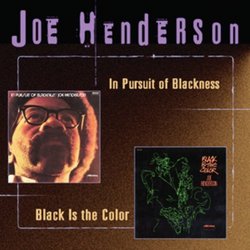| All Artists: Joe Henderson Title: In Pursuit of Blackness Members Wishing: 0 Total Copies: 0 Label: Milestone Release Date: 2/2/1999 Genres: Jazz, Pop Styles: Modern Postbebop, Bebop Number of Discs: 1 SwapaCD Credits: 1 UPCs: 025218478021, 025218903417, 029667603416 |
Search - Joe Henderson :: In Pursuit of Blackness
 | Joe Henderson In Pursuit of Blackness Genres: Jazz, Pop
|
Larger Image |
CD Details |
CD ReviewsGet it if you are a Joe Henderson fan Robert McFadden | Dubai, United Arab Emirates | 05/11/2000 (4 out of 5 stars) "This is an eclectic selection of Joe Henderson work during the period of 1970-72. At first listen there is the tiny sound of early 70s fusion--the electric piano and bass--but it works well 'cause Joe is there to lead with the tenor. Truth be told, the following is offered because it's difficult to tell who worked what ablums just from the title and the timepiece (it's hoped other jazz fans do the same). On this album: Tracks 1,3,5 have Peter Yellen (sax, flute and bass clarinet), Curtis Fuller (trombone, of course), George Cables (p), Stanley Clarke (b), and Lenny White (d); tracks 2,4 include Woody Shaw (trumphet--and a hero of the era and beyond!), Cables (electric p), Ron McClure (b), White (d), Tony Waters (percussion); titles 6-10 George Wadenius (guitar), Cables (b), Dave Holland (b), Ron Carter (electric b), David Horowitz (synthesizer), Ralph McDonald (percussion), Airto (percussion), and Jack DeJonhette (d and electric piano). The recording is nicely done. The compositions run from what are now standards (with the seminal fusion treatment), such as "Invitation," to what was then new Joe Henderson material. If you like Joe Henderson, no matter what the era, this is a must have." Fine music, muddled presentation Tyler Smith | Denver, CO United States | 04/03/2001 (4 out of 5 stars) "This CD brings together two early-'70s Milestone releases in one CD. While the music on each is worthwhile, the original decision on packaging "In Pursuit of Blackness" muddles this otherwise welcome project."In Pursuit of Blackness" joined together live and studio material from two Henderson bands. The two live tracks, culled from a 1970 stint at the Lighthouse in California, include Woody Shaw on trumpet, George Cables on keyboards, and Lenny White and Ron McClure on drums and bass respectively. An entire album, since deleted, "If You're Not Part of the Solution You're Part of the Problem," (surely one of the worst album titles of all time) had previously memorialized this show, and one wishes that Henderson and producer Orin Keepnews had simply released a double album in the first place. Interspersed between these two cuts is studio material from what had become Henderson's new band, of which only Cables and White were carryovers. The loss of Shaw makes this band, in my opinion, slightly less impressive, but the material is still strong, and Cables continues to make strong contributions. For me, he was one of the few pianists to bring a distinctive sound to the electric keyboard. The problem is that there is no clear direction to the collection of tracks. One is left wanting to hear a complete session from one band or the other.That said, the live band is terrific, particularly on "Gazelle," and the listener interested in further documentation of this band is directed to unearth the previously cited title (too long to repeat.) Shaw, Henderson, and Cables comprised a great jazz unit, one that blended traditional hard bop with R&B and funk elements to great effect.The remainder of the CD consists of the entire "Black Is the Color" session, which found Henderson attempting to fuse his diamond-hard, straight-ahead jazz sound with electronics, as was the sometimes unfortunate fashion of the day. The results are mixed but generally satisfying. Henderson's best effort here is the uncomplicated 4-4 blowing session "Vis a Vis," but the very funky "Terra Firma" is also effective. He also tries his hand at flute for a bit of color here and there, the only time, to my knowledge, that he did so on a recording.You may find the somewhat dated moog synthesizer effects of "Black Is the Color" and the confused programming of "In Pursuit of Blackness" a bit disconcerting, but the stellar playing of Henderson, the superb taste of George Cables, and the all-too-brief taste of Woody Shaw's always bright trumpet sound still make this CD a generally worthwhile purchase."
|

 Track Listings (10) - Disc #1
Track Listings (10) - Disc #1